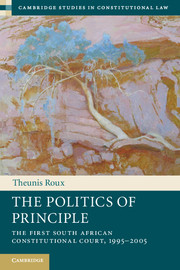Book contents
- Frontmatter
- Contents
- Acknowledgements
- Introduction
- Part I Problematic, Theory, Methodology
- 1 The Chaskalson Court's achievement
- 2 A conceptual framework for assessing the performance of constitutional courts
- 3 Operationalising the conceptual framework to explain the Court’s achievement
- Part II Context
- Part III Thematic Case Studies
- Conclusion
- Bibliography
- Index
2 - A conceptual framework for assessing the performance of constitutional courts
Published online by Cambridge University Press: 05 April 2013
- Frontmatter
- Contents
- Acknowledgements
- Introduction
- Part I Problematic, Theory, Methodology
- 1 The Chaskalson Court's achievement
- 2 A conceptual framework for assessing the performance of constitutional courts
- 3 Operationalising the conceptual framework to explain the Court’s achievement
- Part II Context
- Part III Thematic Case Studies
- Conclusion
- Bibliography
- Index
Summary
As Chapter 1 has endeavoured to show, the criteria that judicial politics scholars and liberal legal theorists use to evaluate the performance of constitutional courts are different and not obviously related. In large part, this has to do with the factors these two fields have traditionally been prepared to countenance as actual or permissible influences on constitutional adjudication. While judicial politics scholars have tended to emphasise, mainly as a descriptive matter, a wide range of contextual factors, liberal legal theorists have primarily been interested in the nature and permissible scope of judicial reasoning. The separation between the two fields is not absolute, however, and the last fifteen years have seen a number of calls for interdisciplinary research in this area. The challenge laid down in such calls, to liberal legal theorists in particular, has been to ground normative theorisations of judicial review in realistic accounts of the political contexts in which constitutional courts operate.
This chapter must be understood against this background. For reasons given in the previous chapter, however, the aim is not so much to provide a contextually grounded theory of judicial review as to develop an interdisciplinary conceptual framework for assessing the performance of constitutional courts. In order to do this, the chapter argues, what we need is a mediating concept – some way of conceiving of the factors that judicial politics scholars and liberal legal theorists respectively emphasise that brings them into relation with each other, allowing their mutual interaction to be explored. The most appropriate candidate for such a concept is the notion of ‘constraint’, which is defined here as a particular type of influence on judicial behaviour disregard for which entails a loss in legal or political terms.
- Type
- Chapter
- Information
- The Politics of PrincipleThe First South African Constitutional Court, 1995–2005, pp. 72 - 111Publisher: Cambridge University PressPrint publication year: 2013

